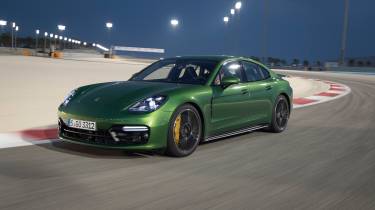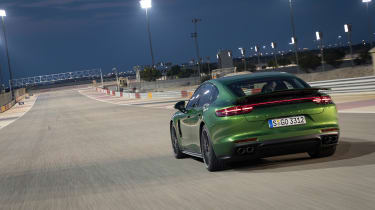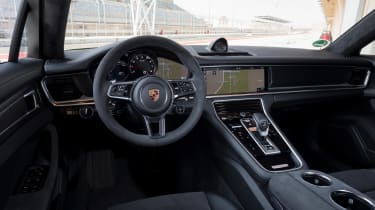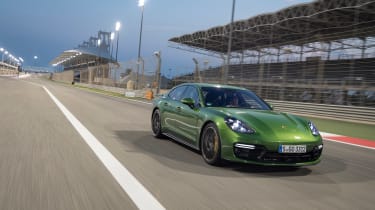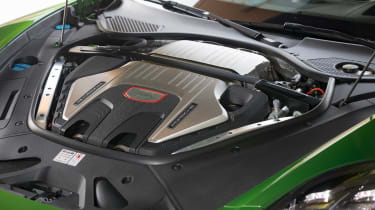New 2019 Porsche Panamera GTS review - new Panamera to tempt AMG E63S customers
Chassis tweaks make the Panamera GTS the driver’s choice, but it could do with a more powerful and charismatic engine
Porsche models with the GTS badge are arguably the sweet spot in any line-up. By cleverly balancing sharper driving dynamics against everyday usability, they are designed to deliver a more compelling driving experience compared to the regular trim lines. It’s a similar story with the latest 453bhp Panamera GTS, which slots into the range between the entry-level 4S and the full-house Turbo and is simed at the more powerful, but similarly priced Mercedes-AMG E63 S and BMW M5 Competition, the five-door four-seat coupe Porsche (there’s also a Sport Turismo version for fast estate fans).
Externally, you’ll spot the GTS courtesy of its gloss black finish for the lower bumper inserts, window surrounds, badging and 20-inch alloy wheels, which are imaginatively called ‘Panamera’. Inside, the upgrades run to Alcantara trim for the seats and steering wheel, plus natty GTS logos for the kick plates, rev counter and the head restraints of the high-backed front seats.
> Click here for our review of the new Mercedes-AMG GT63 S four-door
Technical highlights
As with all Panamera models the GTS is fitted with Porsche’s latest three-chamber air suspension and adaptive dampers. The GTS sits 10mm lower than the Panamera 4S with the dampers subtly recalibrated for even greater control, particularly on track. There are also stiffer anti-roll bars (20 per cent front and 30 per cent rear), which makes the GTS a firmer and quicker-reacting car than the Turbo.
More reviews
In-depth reviews
Long term tests
Reviews
Also upgraded with a view to extra circuit work are the brakes, which are 390mm-diameter cast iron discs with six-piston calipers at the front, with 365mm rotors and four-pot calipers at the rear. As you’d expect there’s a carbon-ceramic upgrade, which weighs in at a wallet-bashing £6707 for the circa 20kg saving.
Brakes aren’t the only dynamic upgrade option and, as with many Porsches, the level of customisation is only really restricted by your dynamic requirements (and your credit score).
£1536 will get you four-wheel-steering that aims to boost low-speed agility and high-speed stability. A further £3527 is required for the 48V Porsche Dynamic Chassis Control (PDCC) that uses electro-mechanical actuators to stiffen or relax the anti-roll bars to deliver virtually roll-free handling and a more supple ride. PDCC also adds Porsche Torque Vectoring (PTV) Plus, which can actively distribute torque across the rear axle for greater agility and less understeer on the exit of a corner. On the GTS this set-up also mimics the passive suspension’s extra roll stiffness when it’s in its standard setting. Clever stuff.
Externally, the GTS gets a revised active rear spoiler that features extra elements that create a larger surface area for reduced lift over the rear axle at speed.
Engine, transmission and 0-60mph
Under the long, long bonnet of the Panamera is a lightly detuned version of the Turbo’s 542bhp twin-turbocharged 4-litre V8, the unit producing 453bhp between 6000 and 6500rpm and 457lb ft of torque in a virtually flat line from 1800 to 4500rpm.
Porsche’s eight-speed twin-clutch PDK is the only transmission option, so too four-wheel-drive, with the GTS’ Porsche Traction Management (PTM) system software tuned to give the car a more rear-wheel-drive feel, with the rear axle continuing to take more torque even when the rear starts to slide under power.
Standard launch control allows the GTS to reach 60mph in just 4.1sec before accelerating relentlessly to a 181mph top speed. There’s such a linear nature to the delivery that, combined with the car’s refinement it doesn’t always feels as quick as the numbers suggest. That said, the addition of a standard sports exhaust brings a welcome baritone backbeat when accelerating hard and some snap, crackle and pop on the overrun.
As ever, the Porsche’s PDK gearbox remains the apogee of the twin-clutch art. Simply smoke around minding your own business and it changes up swiftly and smoothly, utilising the engine’s prodigious wedge of torque. Engage Sport or Sport Plus and it changes ratios even swifter, hanging on to revs for extra acceleration and shifting down promptly as you brake for a corner. Of course, you can always take control yourself using either the lever or the wheel-mounted paddles.
What’s it like to drive?
Unsurprisingly, the GTS feels just as you’d expect – a sharper and more involving version of an already poised and engaging sports saloon. Now, full disclaimer here, but our time with the car was split between the heavily policed roads of Bahrain and the Sakhir Formula 1 circuit. On the road, the extra stiffness in the suspension is just about evident at low speed, but for the most part the GTS rides with similar supple composure as other models. Sharp ridges and broken surfaces cause some ripples through the cabin, but that’s mainly down to the suspension desperately trying to contain those massive 20-inch alloys.
Even at low speed the Panamera’s steering feels good, offering a quick but not nervous rate of response (our car was fitted with four-wheel steering), while even in Normal mode the weighting treads a fine line between heft and ease-of-use. It’s a car that feels all of a piece, a sensation that’s helped by the spot-on weighting of the major controls and a driving position that’s low set compared to saloon rivals.
On the track, the Panamera is as agile and responsive as you can expect a near-two-ton car to be. Through faster corners, the combination of tighter body control and the freakishly effective all-wheel steer allows the GTS to cling tenaciously to your chosen line. Give the throttle a little lift or get back on the power and you can feel the car subtly rotating, trying to point you straighter, sooner, something that’s aided by the GTS’ rear-biased four-wheel drive system.
Of course, the Panamera is a heavy car and it can’t totally ignore the laws of physics, but it has a bloody good go. Try to carry too much speed into Sakhir’s second and third-gear switchbacks and the nose will push inexorably wide, while really big loads through faster turns will have the car hopping around a little as the combination of fat rubber, four-wheel drive and torque vectoring try to impose their will on the tarmac. The optional carbon-ceramic brakes fitted to the test cars haul the GTS down from big speeds.
If there’s a disappointment at the track, then it’s the engine. There’s no real lack of poke from the V8, but neither is there much drama. It pulls with muscular vigour from low down and there’s a distant, throaty growl, but the linear delivery and lack of top end makes it a bit of an anti-climax just when the rest of the car is getting up on its toes and starting to really get into its stride.
Price and rivals
You’d struggle to call the £105,973 Panamera GTS cheap, especially when you compare its performance per pound rating with immediate rivals, such as the BMW M5 Competition and Mercedes E63 S. Yet despite this, in its chassis the Porsche offers something that others can’t match, at least not until the Mercedes-AMG GT 4-Door arrives officially in 2019. The Porsche also doesn’t disappoint with its kit count, coming loaded with most of the luxuries you need, and a few you probably don’t. However, it’s important to remember that the car we drove was backed up by a whole host of dynamic optional extras in the form of the four-wheel steering, Porsche Dynamic Chassis Control and carbon-ceramic brakes. The cost for this little lot? £11,770.
The recently launched BMW M5 Competition weighs in at £96,205, which is nearly ten grand less that the Porsche. With a healthy 616bhp it’s comfortably got the Panamera covered for performance – not only is it quicker, the way the twin-turbo V8 delivers its prodigious poke is more exciting. The taller BMW is not quite as impressively agile as the Porsche despite being much the same size and weight, but it’s a fairly entertaining piece of kit, especially given you can switch it to rear-wheel drive at the touch of a button.
It’s a similar story with the £94,725 Mercedes-AMG E63 S, which suffers from a comfort and refinement shortfall in its efforts to contain the large body’s masses and the volcanic forces of its 604bhp twin-turbo V8. It delivers its performance in a far more exciting way than the Porsche, too, serving up great gobs of torque low down and chasing the red line with surprising energy. Switchable four-wheel drive means tail-out fun if you want it, but on the road the set-up delivers more than enough rear-biased balance to keep you entertained. Yet like the M5 there’s always the sense that the car is ultimately facing a losing battle to keep all those masses in check.
